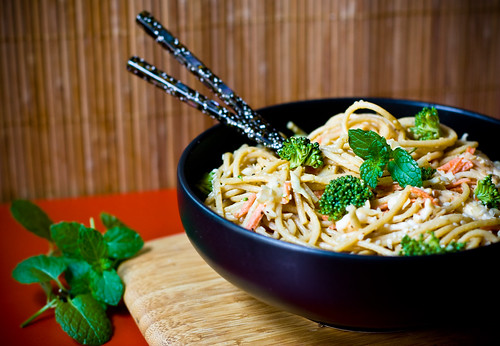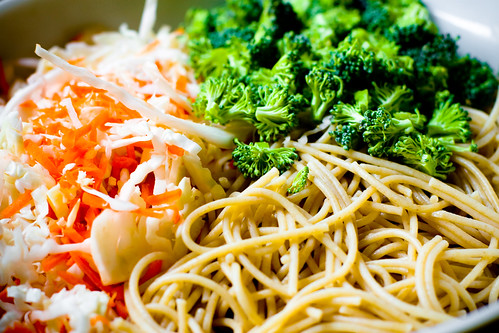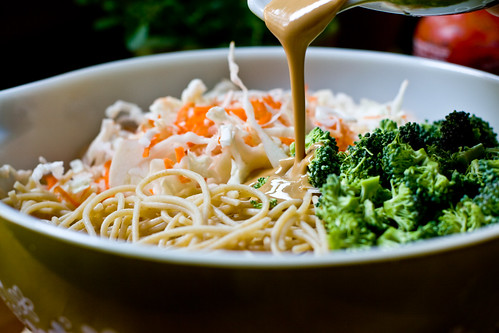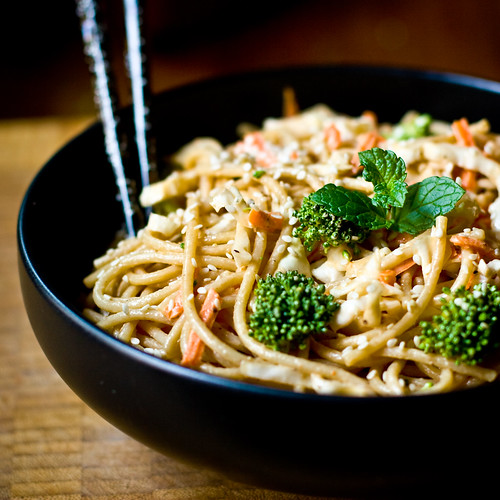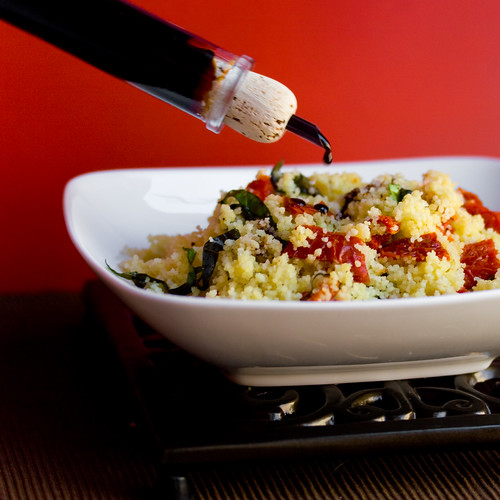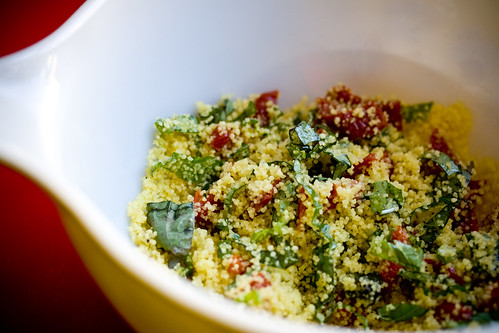Nearly Raw Tahini Noodles
It’s officially Summer; I can’t deny it any longer. I’m eating way more than my fair share of tofu sandwiches, and even the heat emanating from the toaster can be too much for me sometimes. If you can find some part of the day to boil noodles (in the cool of the morning, or before bed), you can make them ahead of time and be done with the only cooking required for this dish.
Earlier this year I was reading Coconut and Lime, and where Rachel had the brilliant idea of making a peanut sauce without peanuts. Her stand-in was sesame paste, and she created a fabulous sesame noodle dish that I couldn’t get out of my head. I absolutely had to make a sauce based on sesame paste. My recipe is different than hers (though hers is mighty tasty, so if you don’t care for my version give hers a try), but she was definitely the inspiration for this sauce that has quickly become a staple in my house.
Notes on Tahini and Sesame Paste
I use tahini in this recipe, which is a paste commonly used in the Middle East made from hulled sesame seeds. The seeds can be raw or roasted, and the flavor will vary depending on which one you choose. My favorite tahini is Arrowhead Mills Organic Sesame Tahini, which is unroasted. It’s not too bitter, and it stays smooth and easy to use even after refrigeration. Roasted tahini will also work great in this recipe, but the flavor will be noticeably different
Sesame paste, on the other hand, is an Asian ingredient that turns the whole sesame seed, including the hulls, into a paste. It’s stronger than tahini, so you usually need much less in your recipes, and using too much can cause the dish to be more bitter than you expected. While you can find tahini at any supermarket now (look near the peanut butter), Asian sesame paste still seems religated to specialty markets.
This dish is largely raw, which cuts down on a lot of the work, and prevents your summer kitchen from becoming a sauna. I’ve found that if you cut your veggies small enough and have a great sauce, you’ll be surprised at what you can serve raw. If you like, you can lightly steam the broccoli, but it really is tasty simply cut into tiny florets. If you follow a raw food diet, feel free to substitute the cooked wheat noodles with cucumber or zucchini noodles, or whatever raw noodles make you the happiest. Pretty much anything will work as the base of this dish.
The other benefit this dish is that it keeps really well, so I like to make a big batch to keep in the fridge for lunches, snacks, or meals to go.
Oh! And one more thing! Have you tried Whole Foods’ whole wheat spaghetti yet? It tastes exactly like regular spaghetti, only it’s better for you than the stripped down stuff. If you’re looking to add more whole grains into your diet, this is a super easy–even unnoticeable–way to do it. They are by far the best whole wheat noodles I’ve ever had.
Nearly Raw Tahini Noodles
Serves 4 to 6
1/2 lb Whole Wheat Spaghetti, cooked, rinsed in cold water, drained
2 Carrots, peeled and shredded
1/4 Green Cabbage Head, shredded
1 Stalk Broccoli, florets only, cut very small
A Handful Fresh Mint, chopped, optional (cilantro or basil would be good, too)
Sesame Seeds and More Mint, for garnish
Tahini Sauce
1/4 Cup Tahini, see section above
2 Tbs Low Sodium Tamari, or nama shoyu, or regular soy sauce
3 Tbs Water
1 Tbs Sugar, or raw agave nectar
1 Tbs Rice Vinegar
1 tsp Chili Sauce or 1 Chopped Fresh Chili
1 tsp Dijon or Stone-ground Mustard
1 Pinch Salt, if needed
Lots of Fresh Black Pepper
Cook the noodles and rinse under cold water. Drain and set aside, coating lightly with oil if desired to prevent the noodles from sticking. These can be made well in advance.
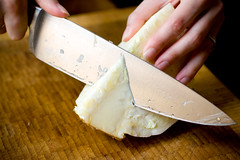 Cut your cabbage into quarters, then use a large chef’s knife to remove the core from one of the quarters, as shown at left. Discard the core, and wrap up the other three quarters for later use.
Cut your cabbage into quarters, then use a large chef’s knife to remove the core from one of the quarters, as shown at left. Discard the core, and wrap up the other three quarters for later use.
If you have a food processor, use it to shred your carrots and your cabbage. Use the shredder blade that has many holes for the carrots, and the blade that has one single slit for the cabbage. A box grater will work just fine for the carrots and a knife for the cabbage if a food processor is not available.
Chop the broccoli into small florets, creating pieces no bigger than small grapes. Toss all the veggies together and add the pasta. Stir together the sauce, tasting to adjust if needed.
When you’re ready to serve, add the sauce to the noodles and veggies and toss with your hands, coating everything evenly. Add chopped mint at the last moment, if using. Garnish with more mint and sesame seeds.
This will easily keep for a couple days. If you’re a big fan of sauce, you may want to double the recipe. This recipe makes just enough to coat the noodles. Extra sauce will really come in handy after the completed dish has been refrigerated for a bit; I find noodles really soak up sauces so it can be nice to have some extra on hand.
If you’ve tried tahini and disliked it, give it another chance. It’s kind of vile on its own, so balancing flavors is very important with this ingredient. If you want a little tahini flavor but can’t quite use the full 1/4 cup, consider adding some peanut butter in lieu of tahini. Personally, I find this a really refreshing change from the typical peanut sauces, and since it’s so easy to make, why not give it a shot?
